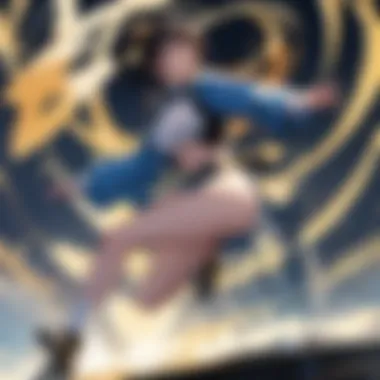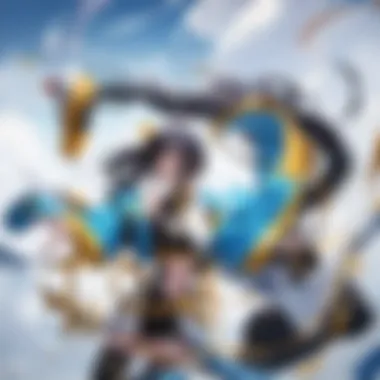Rizza's Cultural Impact on Wu-Tang Clan and Beyond


Intro
The intersection of hip-hop and popular culture often reveals complex narratives and influential figures. One such figure is Rizza, a core member of the Wu-Tang Clan. His impact extends beyond music; he has also influenced the realms of anime and manga. This article will explore Rizza's artistic philosophies, the distinctive sound of Wu-Tang, and how these elements resonate with themes from anime and manga. In doing so, it addresses the shared storytelling, identity, and community aspects of both cultures, offering a deep insight into their confluence.
Character Profiles
Overview of Main Characters
Rizza stands as the primary figure of this exploration. He is not only the de facto leader of Wu-Tang Clan but also a visionary producer and director. His role in shaping the Clan's identity is paramount. Rizza's signature style combines various musical influences, ultimately crafting a sound that is both innovative and reflective of the struggles within urban communities.
Wu-Tang Clan comprises several key members, each contributing unique elements to the overall narrative. GZA, known for his intricate lyricism, often weaves complex themes into his verses. Raekwon and Ghostface Killah provide vivid storytelling, bringing life to their lyrics through personal anecdotes. Each member's individual persona enriches the textual landscape that Rizza orchestrates.
Supporting Characters
Beyond the core members, the Wu-Tang Clan has interacted with numerous artists and cultural figures. Collaborations have included notable names like Nas, and even those from the anime community such as Shinichirō Watanabe. These connections illustrate the broader cultural dialogue that influences and inspires Rizza and the Clan.
Theme Exploration
Central Themes
Rizza's work grapples with themes of resilience and identity. Much like protagonists in anime and manga, the stories told in Wu-Tang’s music reflect the struggles of the individual against societal pressures. The lyrics carry messages of hope, struggle, and victory. In any anime, these elements are fundamental, as they resonate with audiences looking for connections to their experiences.
Cultural References
Rizza's engagement with anime is not merely superficial. He integrates themes and aesthetics prevalent in manga into Wu-Tang's storytelling. For instance, references to martial arts and film elements from works such as Akira and Samurai Champloo are common. This blending of cultures serves to deepen the narrative layer in both music and anime, establishing a shared lexicon
"Rizza's ability to blend diverse cultural elements into a cohesive narrative in Wu-Tang's music has reshaped how fans perceive both hip-hop and anime."
Popular Series and Recommendations
Top Anime Series of the Year
Some current anime series resonate with themes found in Rizza's work:
- Attack on Titan: Explores themes of power, community, and the individual’s fight against oppression.
- Jujutsu Kaisen: Investigates the struggles against darkness, much like the challenges faced in Rizza’s narratives.
Hidden Gems in Manga
In addition to mainstream anime, there are lesser-known manga that reflect similar themes:
- Vinland Saga: This series intertwines themes of revenge and identity.
- Parasyte: Combines science fiction with moral dilemmas, reminiscent of Wu-Tang's exploration of deeper societal questions.
Prelims to Rizza and Wu-Tang Clan
To understand the cultural significance of Rizza within the context of the Wu-Tang Clan, it is essential to explore the foundational elements of this legendary hip-hop collective. Rizza, as the primary producer and creative mind behind Wu-Tang Clan, shaped not just their sound but also their identity and philosophy. This section will elucidate how Rizza's profound influences laid the groundwork for a movement that transcended music, intersecting significantly with various aspects of popular culture.
Rizza: A Brief Overview
Rizza, born Robert Fitzgerald Diggs, is noteworthy for his multifaceted contributions to the music industry. He is celebrated as the mastermind producer of the Wu-Tang Clan, connecting traditional hip-hop with innovative sounds. His approach to music production involves a unique blend of sampling, complex arrangements, and an uncanny ability to bring the personalities of individual members into the spotlight. Rizza's vision was not limited to mere sounds; it included a narrative structure that defines Wu-Tang's artistic output. His philosophical leanings, influenced by Eastern philosophies, permeate their lyrics and overall aesthetic. Rizza’s work encourages listeners to explore deeper themes involving identity, conflict, and community, making him a pivotal figure in the evolution of both hip-hop and broader cultural discourses.
The Formation of Wu-Tang Clan
The inception of Wu-Tang Clan in the early 1990s marks a significant turning point in hip-hop. It originated in Staten Island, New York, with a group of young men who shared not only a love for music but also a common cultural background. As diverse as the members were, Rizza played a crucial role in unifying their talents. The formation of the group was strategic; it involved combining the strengths of individual artists like Method Man, Ghostface Killah, and Raekwon, among others. Rizza’s vision for the group extended beyond mere music creation. He sought to create a brand that would resonate with fans on multiple levels. Through their first album, "Enter the Wu-Tang (36 Chambers)," released in 1993, the group's raw and gritty sound coupled with complex lyricism set them apart from their contemporaries.
Rizza’s ability to blend hardcore street narratives with philosophical introspection crafted a unique identity. This fusion was not just appealing, it was revolutionary for the era. The formation of Wu-Tang Clan, heavily influenced by Rizza's guidance, established a template that many groups would follow.
"Wu-Tang is for the children." – Rizza
This iconic quote reflects their desire to impact broader societal conversations while also engaging with the youth culture of the time.
Musical Innovations
The impact of Rizza and the Wu-Tang Clan on musical innovation is significant. Their approach to hip-hop has left a lasting mark on the genre. Rizza's production techniques not only define the Wu-Tang sound but have also influenced countless artists that followed. The blend of technical skill, creativity, and cultural insight sets their music apart. This section will outline some major innovations in sampling and lyricism that have shaped hip-hop culture.
Sampling Techniques
Sampling is a prominent aspect of hip-hop music, and Rizza's contribution is notable. His method involves using samples from various genres, notably old soul tracks, martial arts films, and even obscure records. This offers a distinctive sound that is authentic and layered. Rizza’s ear for quality is evident in his choices, leading to tracks that resonate emotionally.
- Layering samples: Rizza often layered multiple samples together, creating a rich, textured sound. This technique adds depth.
- Use of dialog samples: Incorporating lines from kung-fu movies and other cultural references adds a unique thematic layer to the music. It’s a way to connect different cultures and resonates with his fans.
- Beat construction: Rizza's beats often feature raw, unpolished edges, which reflect the gritty reality of urban life. This authenticity is crucial in hip-hop.


Rizza's sampling techniques go beyond creating catchy hooks. It also establishes a narrative frame, inviting listeners into a conversation with music history. His work emphasizes how art can draw from varied influences, joining different cultural realms together.
Lyricism and Themes
Lyricism in Wu-Tang's music is another area of innovation. Rizza's influence here extends deeply into the way narratives are woven together in the tracks. The group often addresses themes of struggle, identity, and spirituality.
- Street narratives: Wu-Tang's lyrics reflect the experiences of city life. They highlight socio-economic issues, giving voices to those often unheard. This connection is crucial for fans who identify with these realities.
- Philosophical exploration: Rizza incorporates elements of Eastern philosophy and spirituality into the lyrics. This deepens the discourse found in hip-hop. The use of concepts like wisdom and the duality of life invites listeners to think critically.
- Wordplay and metaphor: Rizza’s skilled use of language brings complexity that separates Wu-Tang's lyrics from mainstream rap. The clever wordplay engages listeners, rewarding them with multiple layers of meaning.
Through these lyrical innovations, Rizza and Wu-Tang Clan shape an articulate cultural identity. Their music evolves beyond mere entertainment, establishing dialogues about complex themes that resonate across generations.
"Music is a reflection of culture, and Rizza's approach to sampling, paired with profound lyricism, has forever changed the landscape of hip-hop."
Rizza's Role in Wu-Tang's Artistic Identity
Rizza's significance in Wu-Tang Clan's artistic identity is multifaceted and profound. His creative vision and leadership have shaped the direction of the group, that is why it is important to analyze not only his contributions but also the impacts these contributions have on the broader music and cultural landscape. Rizza's development of a unique sound, rooted in intricate sampling and innovative beats, is one of the factors that led to Wu-Tang Clan's rise to prominence. This blending of hip-hop with elements from other genres, particularly martial arts and Eastern philosophies, sets them apart.
Rizza also served as the primary producer for much of the Clan's early work. His keen ear for sounds and ability to capture the essence of various influences allowed the group to create a distinctive style. This sound is characterized by minimalist beats and complex lyrical deliveries, creating an engaging platform for storytelling.
Furthermore, Rizza's role extends beyond mere production. He is a central figure in the artistic philosophy of Wu-Tang Clan, offering a vision that incorporates not only musical elements but also a cohesive narrative that resonates with fans. This narrative weaves together themes of resilience, cultural identity, and spiritual growth, making the music relatable for a wide audience.
Overall, Rizza's influence on Wu-Tang can't be understated. His artistry has fostered a space for deeper exploration of culture in hip-hop, attracting both devoted fans and new listeners.
Philosophical Influences
Rizza's artistic vision is deeply influenced by various philosophical ideologies. His interest in the teachings of Zen Buddhism and martial arts philosophy shapes much of Wu-Tang's lyrical content. This influence is apparent in their lyrics, which often reflect themes of mindfulness, discipline, and self-understanding, encouraging listeners to look beyond surface-level interpretations.
Rizza’s engagement with these philosophies adds layers to the group's music. He juxtaposes complexity and simplicity in a way that speaks to both casual listeners and those seeking a deeper connection. The teachings from martial arts influence not only the lyrics but also the group's approach to music itself, promoting discipline and a strong work ethic among artists.
Additionally, Rizza often draws inspiration from Eastern philosophies, intertwining them with themes prevalent in African American history and culture. This cross-pollination creates a rich dialogue within their lyrics.
"Music is the language of the universe. Rizza understands this cosmic connection, utilizing his art to bridge worlds."
Collaborative Dynamics
The collaborative dynamics within Wu-Tang Clan are shaped significantly by Rizza's leadership. He has fostered an environment that values each member's individuality while encouraging mutual support and creativity. Each artist in the group has distinct talents, and Rizza effectively leverages these differences to craft a unified sound.
His ability to bring diverse voices together creates a platform for collaboration that extends beyond traditional hip-hop boundaries. Members can experiment with different styles within Rizza's framework, reflecting a collective identity rather than one dominated by a singular vision.
Rizza's role as a mediator and facilitator makes him indispensable. He navigates the creative processes, ensuring that every member feels heard and valued. This approach contributes to the Clan's longevity, allowing them to evolve without losing their essence. The synergy that Rizza cultivates not only creates music but also fosters a sense of community, both within the group and among their fans.
Intersections with Anime and Manga
Cultural Crossovers
Rizza, as a prominent figure in Wu-Tang Clan, has often cited anime and martial arts films as major influences on his creative process. This affinity has led to numerous cultural crossovers that are evident in both his music and visual aesthetics. For example, various Wu-Tang Clan albums have incorporated anime-inspired artwork and references, bringing elements of Eastern culture to Western audiences.
These crossovers serve to expand the narrative possibilities within hip-hop. By integrating anime motifs, Rizza not only pays homage to these sources but also reinterprets them within the context of hip-hop storytelling. The visual and thematic parallels between the gritty realism of hip-hop and the intense narratives of anime and manga create a rich tapestry of cultural exchange.
- The fusion influences fans from both communities and helps break boundaries between differing cultures.
- Rizza explores concepts of honor, legacy, and struggle that resonate in both hip-hop and various anime storylines, creating a timeless dialogue that speaks to the human experience.
Storytelling Parallels
Storytelling remains a pivotal aspect of both Rizza’s music and anime narratives. Both art forms share an essential function: they convey complex emotions, life lessons, and universal themes through engaging characters and narratives. Rizza's lyrics often echo the themes found in popular anime, such as the journey of self-discovery, camaraderie, and the fight against adversity.
For example, in many anime series, characters grapple with challenges that define their journeys, mirroring the struggles portrayed in Wu-Tang’s music. This similarity enhances the experience for fans of both mediums, fostering a deeper understanding of the narratives being told. Rizza’s storytelling style is also characterized by the use of vivid imagery and symbolism, much like the visual storytelling seen in manga and anime.
"The connections between Rizza’s lyrics and anime narratives create a relatable experience for audiences, bridging cultural gaps and fostering understanding."
In summary, the intersection of Rizza's work with anime and manga illuminates the broader cultural significance of his contributions to the Wu-Tang Clan’s legacy. The synthesis of hip-hop with anime creates a unique space for storytelling that speaks to diverse audiences, enriching both cultures through shared themes and narratives.
Rizza's Influence on Modern Artists
Rizza's impact on modern artists is both significant and expansive. His role as a producer and mentor has created pathways for many who seek to blend elements of hip-hop with various musical genres and cultural influences. This section will examine how Rizza's innovative approach has spurred new generations of artists, shaping their sound and guiding their development in a constantly evolving music landscape.
Mentorship and Production Roles
Rizza's mentorship is not merely about guiding emerging artists in their music careers; it encompasses a broader vision of artistic growth. With his extensive experience in the industry, he has had the opportunity to work with a variety of talents. This experience has allowed him to share insights that are essential in navigating the challenges of today's music industry.
Many artists consider Rizza a vital figure in their careers. For example, he has collaborated with newer acts like Joey Bada$$ and the Flatbush Zombies, imparting knowledge on production techniques and artistic direction. Rizza's hands-on approach in the studio often involves transforming raw creativity into polished, market-ready tracks. This kind of involvement is refreshing in a time when many producers may take a more detached stance.


By holding workshops and engaging with the community, Rizza also fosters a sense of belonging among aspiring artists. His emphasis on authenticity encourages them to explore their unique stories, which is crucial for sustaining the cultural richness of hip-hop.
Emerging Trends
Rizza's impact is reflected in several emerging trends within the hip-hop genre. A noticeable shift is the inclination towards sampled art in music production. Rizza was a pioneer of this technique in the early days of Wu-Tang Clan, laying the groundwork for current artists who utilize similar methods. By creatively sampling various genres, including soul, jazz, and even Eastern music, modern artists are pushing musical boundaries while honoring the past.
The blending of genres is another trend significantly influenced by Rizza. His work showcases how hip-hop can intersect with rock, electronic, and even world music, encouraging artists to defy categorization. This genre-bending approach encourages a diverse sound palette which resonates with younger audiences today.
Rizza's influence also extends to lyrical themes. Contemporary artists often focus on mental health, identity, and social issues—subjects that Rizza explored in Wu-Tang's discography. This shift towards more introspective storytelling draws parallels between artists working in different genres, highlighting the interconnectedness of music and culture.
"Innovation in hip-hop comes from understanding its roots while being bold enough to explore new territories. Rizza embodies this principle."
Cultural Impact of Wu-Tang Clan
The Wu-Tang Clan represents a monumental shift in hip-hop, influencing not only music but also broader cultural discourses. This group transcended the boundaries of traditional hip-hop, pushing the genre into new territories of artistic expression. The significant cultural impact can largely be attributed to Rizza, who played a crucial role in shaping the clan's image and sound. His innovative production techniques and lyrical depth changed how fans and artists perceive hip-hop, making it a vehicle for storytelling and philosophical exploration.
Global Reach and Influence
Since their inception in the early 1990s, Wu-Tang Clan has captured global attention. The collective's unique blend of gritty lyrics, martial arts references, and street narratives has resonated with audiences worldwide. Their influence spreads beyond the United States, impacting artists in Europe, Asia, and Africa.
- Cross-Cultural Influence: Wu-Tang's appeal lies in their cross-cultural connections. Their integration of Asian martial arts and philosophy into their music has deepened the cultural dialogue between hip-hop and other forms of art. There are numerous examples of international artists citing Wu-Tang as an influence, showcasing how the clan has become a model for cultural synthesis.
- Merchandising and Branding: The Wu-Tang Clan's brand has reached commercial heights. From clothing lines to logo usage across various media, their imagery and identity have become staples in global pop culture. This highlights not only their musical importance but also their business acumen. Popular merchandise has created a sense of belonging among fans, uniting diverse groups under the Wu-Tang banner.
- Artistic Collaborations: Wu-Tang's collaborations with various artists across genres have further enhanced their global footprint. Their willingness to engage with artists from different backgrounds fosters inclusiveness within hip-hop, demonstrating its universal appeal.
Legacy in Hip-Hop
Wu-Tang Clan's legacy in hip-hop is profound, marked by their distinct sound and lyrical content. Rizza's vision was pivotal in creating a sound that mirrored the complexities of urban life.
- Innovative Production: Rizza's use of sampling and layered instrumentation set new standards. His approach mixed soulful samples with gritty beats, providing a backdrop that emphasized the narrative quality of the lyrics. This innovation became a blueprint for countless hip-hop producers.
- Complex Lyricism: The lyrical themes explored by the clan often address social issues, identity struggles, and philosophical questions. This depth invites listeners to engage critically with their music, resulting in a more thoughtful consumption of hip-hop. Through their art, they’ve highlighted the importance of narrative in the genre.
- Cultural Identity: The Wu-Tang Clan championed the representation of African American culture and experiences. Their emphasis on identity resonated with a diverse audience, allowing fans from different backgrounds to find connection and community within their music.
"Wu-Tang is for the children." - ODB
By emphasizing complex themes, the Wu-Tang Clan contributed to elevating hip-hop from a purely entertainment medium to a powerful platform capable of exploring profound social issues. Rizza’s influence ensures that their legacy will endure, shaping future generations of artists and fans alike.
Community and Fan Interactions
Community and fan interactions are essential elements in understanding the significance of Rizza and the Wu-Tang Clan's cultural impact. The relationship between the artists and their fan base goes beyond simple admiration or enjoyment of music. It fosters a deeper sense of connection that influences both the creators and the listeners. This connection allows for a shared identity, a sense of belonging, and a communal ethos that extends across cultural boundaries, particularly between hip-hop and anime.
Fandom Dynamics
The dynamics of fandom surrounding Wu-Tang Clan illustrate how Rizza's vision resonates among a wide audience. Fans engage with the music not just passively, but actively, interpreting lyrics and sampling techniques integrated into the songs. The complex narratives infused into each track allow fans to forge personal connections with the content.
- Shared Experiences: Subcultures, such as hip-hop and anime, often collide, with fans relating to themes of struggle, identity, and empowerment. Many fans find that Wu-Tang’s philosophy aligns with the values expressed in various anime narratives.
- Online Community: Social media platforms like Facebook and Reddit offer spaces for fans to discuss their interpretations, share fan art, and delve into thematic analysis. This exchange fosters community, allowing fans to express their art and thoughts publicly and connect deeper with one another.
- Diversity of Engagement: Wu-Tang’s diverse member backgrounds allow for varied interpretations, making the fandom rich and multi-faceted. Whether one connects to Rizza’s philosophical grounding or Method Man's vibrant lyricism, each facet attracts different fans, enhancing the community's depth.
Event Participation and Influence
Fans' enthusiasm often translates into participation in events, which creates platforms for deeper engagement with Rizza's work. Such events are crucial gatherings that reinforce the shared identity among fans. Major concerts and festivals serve not just as performances but as celebrations of a culture. Here are some ways these interactions manifest:
- Live Events: Concerts organized by the Wu-Tang Clan have always been essential in the interaction between fans and artists. The excitement in the crowd, singing along to familiar lyrics, creates a shared emotional experience.
- Conventions: Anime and pop culture conventions often showcase panels about the intersection of hip-hop and anime. There, fans can learn about both worlds and engage in discussions regarding their crossover influence. Rizza's insights about storytelling draw many attendees.
- Collaborative Fan Projects: Fan art and remixes, inspired by Rizza’s sound and themes, flourish in these environments. This creativity illustrates how the fan community not only consumes content but also contributes to Rizza's ongoing legacy.
Rizza has not just shaped hip-hop; he has inspired mutual admiration between hip-hop and anime cultures, reinforcing community bonds through shared artistic principles.
Ultimately, the community and fan interactions surrounding Rizza and Wu-Tang Clan exemplify the power of cultural phenomena to build connections among diverse audiences. This engagement reflects a dedication to the art form, ensuring that its influence continues to thrive.
Philosophical Underpinnings in Music and Animation
The exploration of philosophical underpinnings in both music and animation reveals essential connections that enhance our understanding of cultural narratives. This section will dissect how Rizza's role in Wu-Tang Clan embodies these philosophies and how they parallel with elements seen in anime and manga.
The Role of Philosophy in Hip-Hop
Philosophy in hip-hop often serves as a foundation for lyrical themes and artistic expression. Rizza, as a prominent figure within Wu-Tang Clan, integrates deep philosophical concepts into his music. Themes of struggle, identity, and resilience can be traced back to various philosophical influences. He employs Eastern philosophies, such as Taoism and Buddhism, which emphasized balance and understanding of self. These philosophies provide listeners with a framework to engage with the music on a deeper level.
The use of storytelling in hip-hop, particularly by Rizza, aligns itself with broader philosophical discourses. Lyrics are often layered with meaning, inviting listeners to reflect and engage actively. This engagement fosters a community of listeners who find solace and strength in the music, echoing the traditional philosophical aim of truth-seeking.
"Hip-hop is a mirror to society; it reflects the struggles and triumphs of the people."
Moreover, hip-hop as a form transcends mere entertainment; it becomes a vehicle for cultural and societal critique. The philosophical connections embedded in the lyrics encourage discussions on ethics, morality, and social justice.
Influence of Eastern Philosophies in Anime
Anime and manga have long been influenced by Eastern philosophies, manifesting through themes of spirituality, the cycle of life, and existential inquiry. Rizza’s integration of these philosophies into his music resonates with how various anime narratives function. For instance, series like Naruto and Ghost in the Shell often explore questions of self-identity and the nature of existence, reflective of Buddhist and Taoist ideas.


Eastern philosophies shape the characters and story arcs in these narratives. The characters often face internal struggles that echo the quest for enlightenment and self-understanding. This connection with Rizza’s work highlights a shared ethos: both mediums explore complex human emotions and societal challenges.
- Key Aspects to Consider:
- Unity of All Things: Similar to Wu-Tang's collective ethos.
- Mindfulness and Presence: Integral to both hip-hop and anime narratives.
- Moral Dilemmas: Challenges faced by characters and artists alike.
The interplay between hip-hop and anime creates a layered cultural landscape where philosophy serves as a connective thread. Rizza's contributions extend beyond music; they encourage a dialogue that echoes across different forms of artwork, promoting cross-cultural understanding and appreciation.
Critical Reception and Analysis
Critical reception and analysis play a vital role in understanding Rizza's influence within Wu-Tang Clan and the broader cultural landscape. This section examines the responses from both scholars and fans, highlighting how perceptions have shaped Rizza's legacy and the Clan's ongoing significance. By exploring these perspectives, we can gain insights into the artistic and cultural contributions that may not immediately surface in casual discussions about music or fandom.
Scholarly Perspectives
Scholarly discussions about Rizza and Wu-Tang Clan often focus on various dimensions, ranging from musicology to cultural studies. Researchers analyze Rizza's innovative approaches to production, especially his sampling techniques. His mastery in merging diverse musical elements provides a rich field for academic inquiry. Scholars have noted how Rizza integrates motifs from different genres, creating a sonic landscape that reflects the complexity of urban life in America.
Moreover, scholars highlight Rizza's philosophical underpinnings, which often draw from Eastern philosophies. These influences not only shape the lyrical content but also offer a framework for understanding community and identity within hip-hop. Academics like Tricia Rose in "Black Noise: Rap Music and Black Culture in Contemporary America" emphasize how Rizza’s work transcends mere entertainment to mirror social realities and aspirations.
This academic scrutiny also marks a cultural shift in hip-hop scholarship. Traditionally, hip-hop has been marginalized in academic settings. However, figures like Rizza bring it into critical focus, encouraging interdisciplinary dialogue. By examining the multi-faceted aspects of Rizza's oeuvre, scholars contribute to a nuanced understanding of how hip-hop interacts with other cultural narratives.
Fan Reception
Fan receptions reveal a different, yet equally insightful, viewpoint on Rizza's impact. Wu-Tang Clan, nurtured by Rizza's artistic vision, has garnered a devoted following. This community of fans connects through various platforms, such as social media or forums, where discussions often center around how Rizza's music resonates with their personal experiences.
Fans appreciate the intricate lyricism and the philosophical themes Rizza weaves into his verses. Many express feelings of empowerment and identity through his work. The fandom transcends geographic boundaries and cultural backgrounds, demonstrating the universal appeal of Wu-Tang’s music. Online fan forums like Reddit often showcase discussions that dissect Rizza’s contributions, highlighting tracks that are particularly poignant or innovative.
Moreover, Rizza's engagements in collaborations with contemporary artists further solidify his status. Fans eagerly anticipate new projects, reflecting a shared sense of community and excitement around his creative endeavors. They see Rizza's influence not just in what he produces, but in how he has shaped their own cultural understanding of hip-hop and its intersections with other forms of media.
"Rizza is not just a producer; he is a cultural architect who connects music with broader narratives."
Future Directions of Rizza's Influence
Rizza has firmly established himself as a versatile innovator in the realms of hip-hop and beyond. This section will explore the future opportunities that lay ahead for him, delving into his emerging projects and potential collaborations. Understanding these aspects is crucial, as they demonstrate his continuing impact on contemporary music and culture.
Upcoming Projects
Rizza is known for continually pushing boundaries in his creative endeavors. In recent interviews, he hinted at several upcoming projects. These include a new album that seeks to blend traditional hip-hop with elements of electronic music. The aim is to reach out to a broader audience while still maintaining the core of what defined Rizza's sound.
Additionally, there are talks about a soundtrack he may produce for an upcoming anime series. This project could further solidify his place at the intersection of hip-hop and anime culture, and fans are eager to see how his unique sensibilities will translate into the world of animation.
It will be interesting to watch how these upcoming projects unfold, as Rizza’s input could lead to greater recognition of hip-hop within the anime community.
Potential Cross-Cultural Collabs
The potential for cross-cultural collaborations is vast. Rizza has previously shown interest in working with artists from various genres and backgrounds. There is a notable possibility for collaborations with both Japanese musicians and Western artists who acknowledge Rizza's influence.
Such collaborations could manifest in different ways:
- A fusion album that brings together styles from hip-hop and traditional Japanese music, enriching both genres.
- Collaborative events or live performances that combine visual elements from anime with hip-hop culture.
Rizza's ability to bridge different cultural elements makes these potential collaborations particularly enticing. They hold the promise of creating new narratives that encapsulate a more global perspective in music.
"Rizza's influence transcends music; it includes every realm he touches, especially where culture converges."
In summary, Rizza's future influence will likely thrive as he explores diverse projects and partnerships. His ability to connect various cultural dots suggests that the landscape of music and fandoms will continue to evolve in exciting ways.
Finale
In concluding this exploration of Rizza's cultural significance within Wu-Tang Clan's legacy, it is crucial to focus on several key elements that encapsulate the complexity of his contributions. Rizza's influence extends beyond mere musical innovation; it resonates deeply across various cultural domains, particularly in the context of hip-hop and anime. His ability to blend different art forms and philosophies provides a unique lens through which to view contemporary cultural intersections.
Summation of Key Points
Rizza's artistic journey is marked by several noteworthy features:
- Innovative Sampling Techniques: His use of samples has set a standard in hip-hop production, contributing to a distinctive sound that is both recognizable and influential.
- Philosophical Depth: Drawing from various schools of thought, Rizza’s works incorporate elements of both Eastern and Western philosophies. This has allowed him to connect with diverse audiences.
- Cultural Crossover with Anime: His work with Wu-Tang Clan has parallels in anime storytelling, illustrating shared themes of identity and community. This crossover enriches both the hip-hop and anime landscapes, fostering a greater appreciation for narrative depth.
- Mentorship Influence: Rizza has played a vital role in shaping the next generation of artists through mentorship, guiding emerging trends in hip-hop.
- Global Impact: The reach of Wu-Tang Clan and Rizza’s influence has transcended geographical boundaries, bringing hip-hop culture to a global audience, which parallels the growing international interest in anime.
Reflections on Legacy
Rizza's legacy is not just about music; it embodies a cultural bridge that connects various forms of artistic expression. His work exemplifies how cultural products can interact and enrich one another, leaving a profound impact on fans and artists alike.
Through the lens of Rizza's influence, one can better understand how hip-hop and anime have evolved, often reflecting similar societal issues and narratives. Rizza has demonstrated that art has the power to penetrate boundaries, leading to a more interconnected and culturally rich environment.
Ultimately, Rizza’s contributions to Wu-Tang Clan extend to a broader discourse about identity, storytelling, and community building. His role as a cultural innovator and mentor continues to inspire new generations, ensuring that his impact resonates far beyond his own works.
"Rizza's influence is a masterclass in how creativity can transcend genres, cultures, and generations."
Through this reflective journey, we recognize Rizza not only as a pivotal figure within the Wu-Tang Clan but also as a crucial part of the larger cultural tapestry that continues to evolve through his artistic vision.







